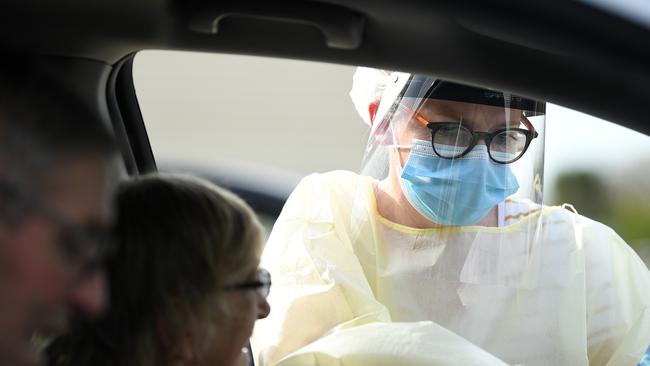US sell-off, oil plunge and vaccine setback take toll on ASX
The benchmark S&P/ASX 200 index lost $41bn of market capitalisation amid broadbased falls.

Another tech-led sell-off on Wall Street, together with plunging oil prices and a safety concern for the AstraZeneca-Oxford coronavirus vaccine spilled into the local sharemarket on Wednesday.
In its eighth-worst day since the bottom of the February-March bear market that followed the start of the coronavirus pandemic, the benchmark S&P/ASX 200 index fell 129.2 points, or 2.2 per cent to 5878.6, losing $41bn of market capitalisation amid broadbased falls.
The index fell as much as 2.6 per cent to a 2½-month low of 5849.4, trading below its 100-day moving average for the first time since June, after big falls in high-flying US tech stocks including Tesla, Apple, Microsoft and Amazon led a sell-off on Wall Street.
But as with the US market, the energy sector was the weakest part of the Australian market after West Texas crude oil futures fell 7.6 per cent to $US36.76 a barrel amid growing doubts about the strength of the global demand as President Donald Trump vowed to end the US’s reliance on China.
Both the S&P 500 and the Nasdaq suffered their biggest three-day falls since the February-March bear market and the Nasdaq entered a technical correction with a 10 per cent fall from a record high a week ago. The Nasdaq also had its worst start to September on record.
Australia’s sell-off was magnified by an 8.1 per cent fall in AstraZeneca shares in after hours trading after the vaccine maker said it halted its coronavirus vaccine trial after a person participating in the trial developed an unexplained illness.
That news initially pushed US futures down more than 1 per cent before a rebound that helped the Australian market recover from its low, albeit it saw the worst close since June 29.
After outperforming global markets with a 1.3 per cent rise on Tuesday, the Australian market was the weakest in the Asia-Pacific and closed at its lowest point since June 29. While the dollar hit a two-week low of US71.92c it was still more than 30 per cent above its March low, effectively magnifying potential capital gains for foreign investors since then.
While noting that the broad pillars of support for the equity market from record-low interest rates, central bank asset-buying and increasing fiscal stimulus remained intact, JPMorgan Asset Management warned that the S&P 500 may take longer to recover than it did after its June sell-off, albeit recent jitters were unlikely to see a repeat of the tech sector collapse of 2000.
The recent sell-off reflected “an accumulation of investor worries centred on the performance of technology and growth stocks, as well as falling oil prices and negative Brexit headlines”, global market strategist Kerry Craig said.
He cautioned that a market fuelled by central bank largesse, economic surprises and record earnings beats in the last few months was “never going to maintain its heady pace forever”.
The September sell-off may have eased concerns surrounding overcrowded positioning in some sectors, but a recovery may take longer to eventuate given the pace of the rally this year, lingering concerns around market concentration and the US presidential election.
“It’s possible that economic momentum in the US starts to wane in the coming months as the initial bounce out of recession fades and fiscal stimulus efforts remain constrained by partisan politics,” Mr Craig said.
“This may limit the ability of economic data to surprise and boost equity markets.”
After bouncing from a record low of minus 145 points in April, to a record high of 271 points in mid-July, Citi’s US economic surprise index has fallen to a still-elevated 183 points, implying that economic data has stopped surprising economists by as much it did after the pandemic hit.
Mr Craig said “the starting point for a leg-up in equities is less favourable now than in June, as aggregate equity short positions have been greatly reduced”.
In his view, markets may move sideways rather than up in the coming months given the near-term event risk, elevated valuations and concentration of returns in the US equities market.
But short-term concerns should not outweigh the longer-term potential offered by growth and tech stocks and the recent jitters were unlikely to lead to a repeat of the tech wreck.
“Today’s technology sector companies are more profitable overall,” Mr Craig said, and there were “future earnings potential in the coming years from areas like cloud computing and artificial intelligence, as well as the benefits that accrue to many of these companies from the shift in corporate attitudes towards physical workplaces”. He added: “Investors typically dislike the uncertainty, particularly when it comes to two key issues, a vaccine and the US election.
“However, easy monetary policy and fiscal stimulus will underpin the equity market as they influence the economic outlook. Governments’ willingness to continue to support household incomes and businesses until a vaccine is readily available or until the virus is brought under control by other means will be key to the economic outlook and investor sentiment.”
Antipodes chief investment officer Jacob Mitchell said that in the current environment, value investing had become “more important than ever” for capital preservation and long-term growth.
While the recent volatility remained a “blip during an extended period of market extremes surpassing the dotcom bubble”, he said it was a reminder of the risks of ignoring value and “blindly chasing momentum”.
Wall Street faced “a very interesting period” after hitting record highs on unprecedented stimulus.







To join the conversation, please log in. Don't have an account? Register
Join the conversation, you are commenting as Logout